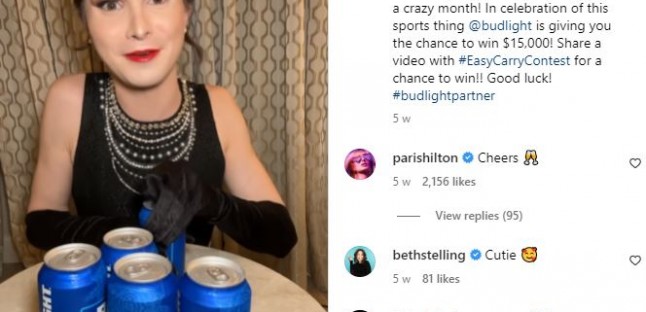Latest posts
A masterclass in creating value
What’s going on at parkrun?
Virtue-signalling all the way to the bank
Bud Light: brand purpose or virtue-signalling?
The Coddling of the American Mind, by Greg Lukianoff and Jonathan Haidt
Belonging, by Owen Eastwood
Such a simple thing
The Long Win, and The Scout Mindset
The Cult of We by Eliot Brown and Maureen Farrell
Coffee and covid modelling
By theme
Marketing strategy
Insight & metrics
Innovation & inspiration
Brand & positioning
Marketing communications
Business purpose
Leadership
By industry sector
Financial services
Retail
FMCG
Technology & start-ups
Consumer services
Business to business
Other sectors
By type
Books
Comment
Quotes
Thought leadership
Bud Light is in the news for a small social media marketing activity which has had a spectacular impact, both large and rapid. It went viral, amplified all over social media and generating massive visibility and awareness. Every marketer’s dream in other words. Except that this one drove sales down. The decision to celebrate transgender influencer Dylan Mulvaney’s 365 “days of womanhood” led to a 26% fall in sales in a matter of days. Whatever you think about transgender rights and demands, this is a timely illustration of how the drive for purpose and meaning can get out of control.
Companies must have lawful employment and other policies. Some may go further than legally required, in their parental policies or healthcare cover, for example. But should those positions be actively promoted in their brands’ marketing communications?
There have long been brands that did exactly that. The Body Shop was founded nearly fifty years ago on Anita Roddick’s activism around protecting the environment, no animal testing, fair employment and fair trade. You bought the brand knowing that’s what it was about. Ben and Jerry’s ice-cream is almost as old, founded by two old hippies who built irreverence and rebellion into the brand, with product names like Karamel Sutra and Cherry Garcia (after their rock idol Jerry Garcia).
That’s not Bud Light though. It’s a mainstream beer often bought without much thought at all. As craft and speciality beers grow, its giant volume is being chipped away, but it’s still the market leader in the USA, perhaps because it’s the default option for a lot of people, a lot of the time. All the same, the VP of Marketing (until recently) wasn’t happy with that. She said Bud Light had been seen as “a brand of fratty, kind of out-of-touch humour” and she wanted to change it. Among her initiatives was to send Dylan Mulvaney some Bud Light cans with Dylan’s face on them, which Dylan featured in social media posts about Bud Light. It’s safe to assume Bud Light paid Dylan for these.
Rather predictably, Bud Light’s core customers didn’t like it. Rather than seeing it as making the brand more inclusive, it came across as preachy and teachy. Were guys across America now expected to think Dylan’s year of womanhood was something they too should celebrate? Kid Rock was one of many who said no, and sales crashed.
So are Bud Light customers transphobic? More likely they are sick of having this agenda pushed into everyday life. Ordering a beer is not a teaching moment. There is a huge disconnect between corporate executives and ordinary people on whether brands should be speaking out on social issues. In a recent survey by the Brunswick Group, 63% of corporate executives thought they should be, while only 36% of the general public agreed. Similarly, on the question of whether corporate activism is effective, 75% of executives said yes, versus 39% of the public. Almost two thirds of people think brands taking a stand on social issues are just virtue-signalling.
This specific issue is particularly polarising. Even many people who have no objection to transgender identification are troubled by the casual way in which Mulvaney appears to have appropriated womanhood, literally as a costume. (See also the Nike sponsored posts for women’s gym apparel including a bra which Dylan definitely doesn’t need.) So the issue is compounded by the fact that Dylan clearly lacks authenticity. That has rubbed off on the brand that decided to sponsor it. The VP of marketing got what she paid for, but not what she intended.
The chief executive of Bud Light owner Anheuser-Busch InBev blamed “misinformation and confusion” on social media. He defended the activity, saying “it was one post. It was not an advertisement.” As so often, the explanation just makes things worse. So what if it was just a post? Didn’t you want people to see it? Or is this a half-hearted way of withdrawing support for the endorsement of Mulvaney? His statement seems like the ultimate proof that they were never really committed to this agenda, thus proving that it did indeed lack authenticity. Result: neither side is happy. They would have been better off if they’d done nothing at all.
Latest posts
A masterclass in creating value
What’s going on at parkrun?
Virtue-signalling all the way to the bank
Bud Light: brand purpose or virtue-signalling?
The Coddling of the American Mind, by Greg Lukianoff and Jonathan Haidt
Belonging, by Owen Eastwood
Such a simple thing
The Long Win, and The Scout Mindset
The Cult of We by Eliot Brown and Maureen Farrell
Coffee and covid modelling
By theme
Marketing strategy
Insight & metrics
Innovation & inspiration
Brand & positioning
Marketing communications
Business purpose
Leadership
By industry sector
Financial services
Retail
FMCG
Technology & start-ups
Consumer services
Business to business
Other sectors
By type
Books
Comment
Quotes
Thought leadership
